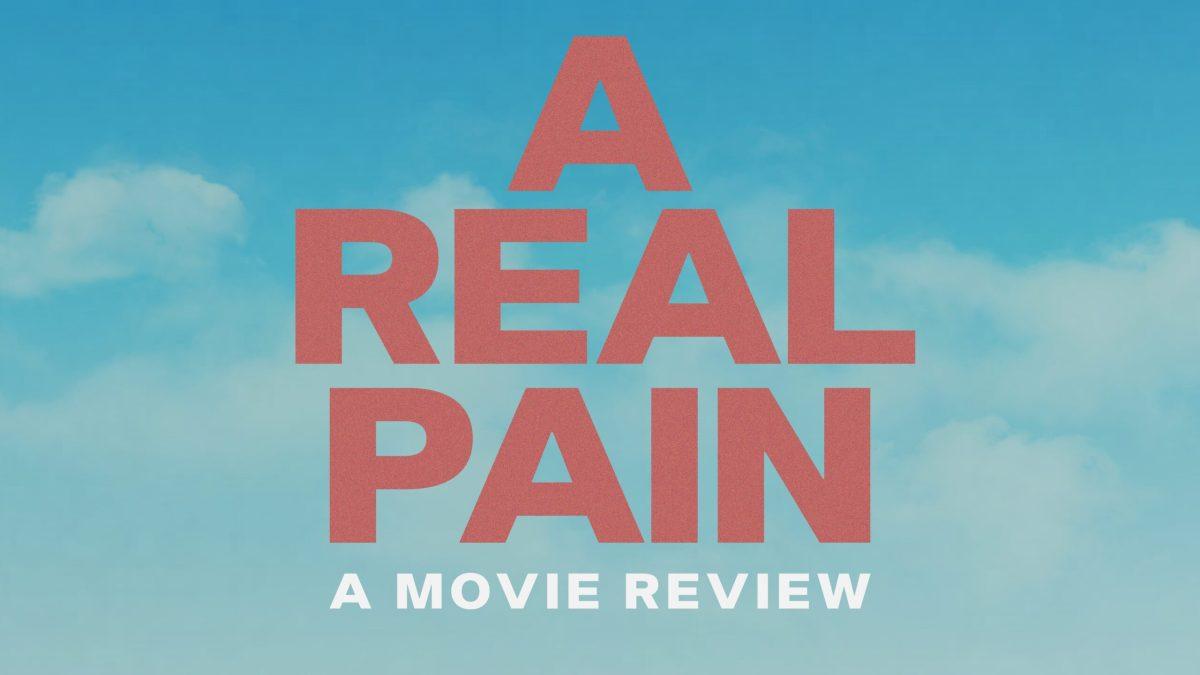
Writer, director and actor Jesse Eisenberg combines forces with actor Kieran Culkin to create a moving story of grief and family, just in time for the holiday season
Though it was only 6 p.m., the sun had already set by the time I was in the car driving to Ragtag Cinema to see “A Real Pain.” The weather outside was typical for a Midwestern winter: biting cold temperatures and harsh winds whipped across my face as I made my way from the parking garage to the theater. It was the Monday directly after Thanksgiving break, and I was already dreading the hectic two weeks ahead of me. Still, I was determined to see this film and escape the looming stress, even if it was only for an hour and a half.
“A Real Pain” focuses on cousins David Kaplan, played by Jesse Eisenberg, and Benji Kaplan, performed by Kieran Culkin, as they travel to Poland following their grandmother’s death. Once close as kids, adulthood pushed them into lives almost entirely separate from each other. David settles in New York City with his wife and children, while Benji still lives in his parent’s basement in Binghamton, New York. Personality-wise, the two couldn’t be more different. David is a reserved, anxious rule follower, while Benji is unfiltered, compulsive and unconcerned with anyone’s opinion of him.
As the title suggests, this film examines the mechanics of pain. Using the lens of familial loss, Eisenberg, who also wrote and directed the film, delves into the individual ways heartache manifests. For David, pain is something to be dealt with efficiently and move past it. Benji has a different, more all-encompassing approach. In his mind, suffering is necessary. He’s disturbed by people who “walk around happy all day,” believing that to be connected with the world around you is to be in anguish. This fundamental difference becomes the central conflict in their relationship – David can’t comprehend why Benji clings to his hurt, while Benji is upset by David’s emotional detachment.
“A Real Pain” arrived at Ragtag just in time for the holiday season, when many of us, like David and Benji, are forced to confront our own family dynamics. As college students are heading home for break, we’re reminded of how our relationships with family evolve. The more we carve out our independent lives, the further we might drift from those we grew up with. Eisenberg’s script captures this strange and distant feeling, exploring the weight of shared familial history and the complicated emotions that surface when we return to our roots.
While the script and direction of “A Real Pain”’ is strong, the film was elevated to a whole new level with the exceptional performances of Eisenberg and Culkin. Culkin’s portrayal of pain is raw and devastating; a scene of him silently crying on a train resonates just as much as him simply introducing himself to their tour group in Poland. He also brings a level of humor to the film that doesn’t subtract from the heavy subject matter; instead, the comedic portrayal of Benji adds to his tragedy. One moment, he’s lighting up a room with his jokes, and the next, he’s draining all its energy. Culkin’s performance breathes life and vulnerability into Benji, which puts the film on a whole other playing field.
Eisenberg balances Culkin’s performance with a more restrained portrayal of David. When he finally allows himself to show emotion it feels unexpected but rewarding. Together, their chemistry brings a believable tension and tenderness to the cousins’ relationship.
While “A Real Pain” doesn’t provide a neat solution to the suffering it explores, it reminds us that pain is what makes us human. The film doesn’t attempt to reconcile David and Benji’s opposing ways of coping but it validates both. It argues that even when we can’t fully understand someone else’s approach to heartache, recognizing and respecting their experience can be its own form of connection.
Leaving Ragtag that night, the cold felt a little more bearable as I found myself reflecting on my own relationships – with family, friends and even myself – and how they’ve shifted over the years. During a time filled with reunions and introspection, “A Real Pain” is a nice reminder that sometimes, simply acknowledging another person’s pain and being for them is all anybody can do.
Edited by Molly Levine | [email protected]
Copy edited by Natalie Kientzy | [email protected]
Edited by Emily Skidmore | [email protected]